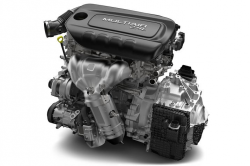
— A Chrysler emissions recall will likely include about 1 million vehicles equipped with Tigershark engines because the vehicles may have illegal tailpipe emissions.
The 2.4-liter Tigershark engines are installed in multiple Chrysler, Dodge, Fiat and Jeep vehicles going back to 2013.
In a regulatory filing with the U.S. Securities and Exchange Commission (SEC), Fiat Chrysler (FCA US) says the Environmental Protection Agency (EPA) has been notified about the possible emissions problems and how the automaker is still verifying which vehicles are affected.
In addition, Chrysler says it is also working on a fix for the emissions irregularities.
A Chrysler emissions recall will likely be announced once FCA and the EPA approve an appropriate solution to repair the vehicles equipped with 2.4L Tigershark engines.
According to federal documents, the emissions problems were discovered during internal testing performed by Chrysler, and the automaker wouldn't venture a guess about the possible costs.
The SEC filing also mentions a separate subject concerning Tigershark engines and how possible problems could cause the automaker to lose money.
According to Chrysler, "we are unable to reliably evaluate the likelihood that material costs will be incurred or estimate a range of possible costs" related to possible oil consumption problems in 1.6 million vehicles. Multiple class action lawsuits allege 2.4L Tigershark engines consume excessive amounts of oil.
Chrysler owners complain their vehicles with Tigershark engines stall when accelerating or decelerating. The vehicles allegedly stall due to low oil levels which drivers are allegedly not warned about through monitoring systems.
Customers driving Tigershark-equipped 4-cylinder engines allege dealerships say vehicles with less than 50,000 miles will require one quart of oil per 1,000 miles of normal driving. And vehicles with more than 50,000 miles on the odometers allegedly need one quart of oil every 750 miles.
Customers also allege they must cope with constant oil changes, repeated dealer visits for oil consumption tests and purchase neverending quarts of replacement oil.
In the SEC filing, FCA says its evaluating and defending against the lawsuits and deciding if any mitigating actions are necessary.
Although the Tigershark engine emissions recall isn't good news for customers who must take the time for recall repairs, emissions recalls are nothing unique or unusual. In 2017, nearly 5 million vehicles were recalled in 86 emissions-related recalls in the U.S.




